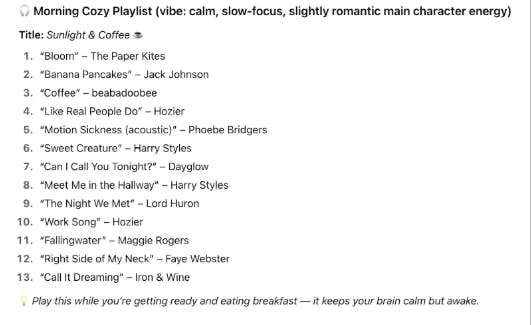Developer Offer
Try ImaginePro API with 50 Free Credits
Build and ship AI-powered visuals with Midjourney, Flux, and more — free credits refresh every month.
My 24 Hour Experiment Letting AI Run My Life
Generative artificial intelligence has become a major player in our lives, assisting with everything from academic work and entertainment to mundane tasks like creating grocery lists. But can it, and should it, handle our day-to-day decisions?
To find out, I embarked on a "decision holiday" for a full day. I informed ChatGPT that I was a student with a fixed 9 a.m. meeting and an 11 a.m. class, and for the next 24 hours, it would make every single choice for me.
An AI-Curated Morning Routine
The experiment began immediately, with AI instructing me to wake up at 7:15 a.m.

When I didn't have a "cozy" lo-fi or acoustic playlist, ChatGPT promptly generated one for me.

Breakfast was a mandated meal of "Greek yogurt + granola + honey + fruit," because, as Chat insisted, I "can’t skip breakfast" and "need the energy." Before my advisor meeting, it even instructed me to take ten deep breaths to set a calm tone.
After the meeting, ChatGPT suggested a reward: a small break consisting of either a walk or a light snack, specifically telling me not to scroll on my phone. It even detailed the snack as a banana with peanut butter. Lacking both, I took its alternative suggestion and went for a walk along the Lakeshore path.
The Convenience of Cognitive Offloading
This experiment quickly made me realize how many small decisions I make every day. I had assumed my routine was fairly fixed, but I found myself constantly asking the AI to choose between trivial things I would normally handle without a second thought.

In a way, it was liberating. I didn't waste mental energy debating what to eat or how to spend awkward gaps of time. This convenience is a demonstration of cognitive offloading, the practice of using external tools to reduce mental strain from tasks like planning and decision-making.
While the efficiency of AI is tempting, it raises questions about its effect on our minds. Outsourcing simple tasks could reduce the need for deep cognitive involvement and critical thinking. Conversely, some scholars argue that by handling simple tasks, AI frees up our mental resources for more complex problems.
An AI Partner That Learns
To make the AI more effective, it's helpful to provide it with 'memories.' You can tell it about your likes, dislikes, allergies, or even your streaming service subscriptions. For example, after I mentioned I had Netflix, ChatGPT changed its evening show recommendation from "New Girl" to "Gilmore Girls."
This ability to process information was also clear when it helped me choose my transportation home. I had a conversation with the AI about my options—bus or walk—factoring in travel times, the weather, the shoes I was wearing, and whether I had an umbrella.
Because I didn't share my typical routine, the AI focused on ensuring my responsibilities, especially schoolwork, were completed. It also sent me to bed earlier than usual, which was probably for the best.

Before ending the experiment, I asked ChatGPT one final question: Does AI help us make better decisions? Its response was telling: AI helps us make better decisions when it’s a partner, not the decider.
My Final Impressions
It's incredibly easy to become dependent on AI for instant decision-making. There isn't a clear-cut answer as to whether this is good or bad; it depends on the context, ethics, and the need for human oversight.
Based on my experience, I don't believe AI should be the primary decision-maker in our lives. While it was an accessible tool that saved time, the convenience came at a cost. I disliked feeling so reliant on a chatbot for my entire day. It felt as if my individuality was being traded for efficiency.
As AI becomes more integrated into our daily lives, this dependency becomes harder to avoid. The more we rely on it, the more we risk losing the very human skills and judgment that AI was originally designed to support.
Compare Plans & Pricing
Find the plan that matches your workload and unlock full access to ImaginePro.
| Plan | Price | Highlights |
|---|---|---|
| Standard | $8 / month |
|
| Premium | $20 / month |
|
Need custom terms? Talk to us to tailor credits, rate limits, or deployment options.
View All Pricing Details

